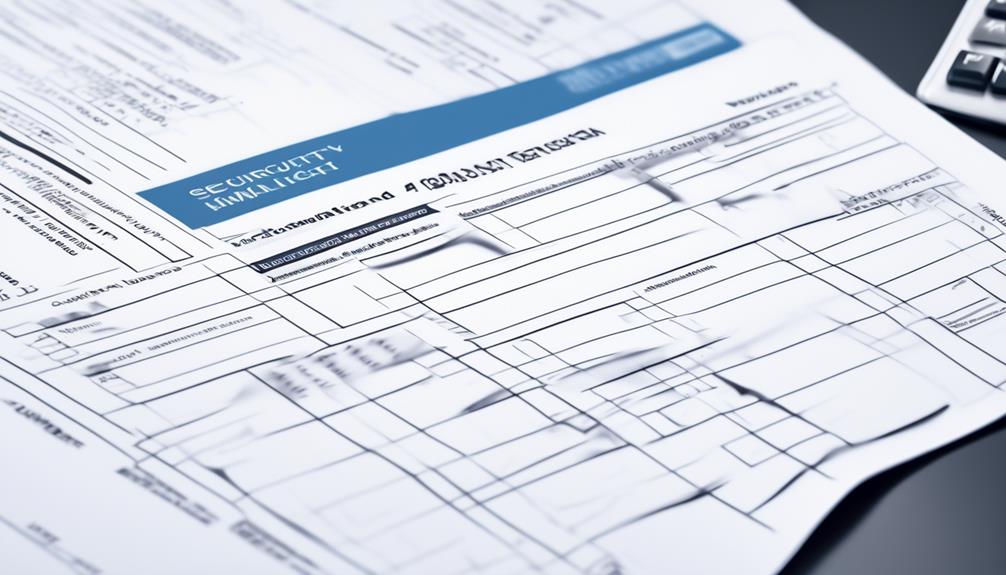When navigating the landscape of BS7858 security checks compliance, you may find yourself traversing a series of stringent yet essential criteria that stand as the cornerstone of thorough vetting processes.
As you embark on this journey, understanding the intricate guidelines surrounding ID verification, financial probity checks, and criminal records screenings becomes paramount. These standards not only serve to safeguard critical security-sensitive roles but also play a pivotal role in upholding industry expectations and ensuring a safe environment for all stakeholders involved.
So, as you begin to unravel the complexities of BS7858 compliance, the foundation laid by these guidelines will undoubtedly shape your approach to security vetting practices.
BS7858 Security Screening Overview
Explore the comprehensive BS7858 Security Screening Overview to understand the stringent standards set for employment in sensitive areas. This screening standard, established by BSI, mandates thorough checks to ensure the suitability of individuals accessing sensitive environments.
The requirements encompass various facets such as ID verification, a detailed 5/10-year career history, assessments of financial probity, scrutiny of criminal records, and checks against global watchlists. Notably, data retention for seven years post-employment is enforced, contributing to public safety and validating the competence of applicants.
By adhering to these protocols, organizations benefit from heightened safety assurance, regulatory compliance, and enhanced trust in the performance of their workforce. For assistance with screening packages or inquiries regarding BS7858 compliance, reaching out to the designated contacts is advisable.
Familiarizing yourself with this overview is crucial for both employers and employees operating in roles that demand the utmost in security standards.
Key Requirements for BS7858 Compliance
To achieve BS7858 compliance, organizations must conduct thorough ID verification and right to work checks. Additionally, a detailed 5 or 10-year written career history is required for screening potential employees.
Beyond that, organizations must also perform financial probity checks and criminal records screenings as part of the compliance process. Ensuring that individuals aren’t listed on any global watchlist is crucial for meeting BS7858 standards.
Furthermore, data retention for a minimum of 7 years post-employment is essential to comply with the regulations. By diligently following these key requirements, organizations can demonstrate their commitment to maintaining a secure and trustworthy work environment in line with BS7858 standards.
Understanding the BS7858 Vetting Process
When undertaking the BS7858 vetting process, it’s crucial to meticulously follow the prescribed steps to ensure comprehensive screening of potential employees. This process begins with verifying the candidate’s identity and checking their right to work.
Subsequently, a detailed 5 or 10-year written career history must be obtained to evaluate the individual’s background thoroughly. Financial probity assessments and criminal records checks are mandatory components of the BS7858 vetting process to ascertain the candidate’s integrity and trustworthiness.
It’s imperative to retain all vetting data for at least 7 years post-employment to comply with BS7858 standards. To streamline this process and guarantee adherence to the guidelines, many organizations opt to outsource their vetting procedures to specialist providers with expertise in BS7858 compliance.
Documentation Needed for BS7858 Checks
Gathering essential documentation is a foundational step in conducting thorough BS7858 security checks. To ensure compliance and accuracy, here are the key documents needed for the screening process:
- Written Career History: You must provide a detailed 5 or 10-year written career history to verify your employment background.
- Proof of Identity and Right to Work: Documentation such as proof of ID, right to work in the UK, and proof of address are essential to confirm your identity and eligibility to work.
- Valid Licenses and Checks: A valid SIA license or basic disclosure/ACPO check is mandatory to demonstrate your qualifications and criminal record status.
Remember that employers are obligated to maintain a screening file for each individual for at least 7 years post-employment, including documentary proof to cover any gaps in employment history. Outsourcing the vetting process to experienced companies can streamline the process, save costs, and ensure full compliance with BS7858 regulations.
Importance of Applicant Support in BS7858
Supporting applicants throughout the BS7858 process is crucial for ensuring a seamless and successful screening experience. By offering assistance, you can help applicants understand the requirements and navigate the complexities of the screening process with ease.
Providing guidance is especially beneficial in addressing any gaps in employment history, ensuring that all information provided is thorough and accurate during verification. Moreover, offering support not only contributes to a positive applicant experience but also helps build trust in the screening process.
Effective applicant support plays a significant role in minimizing delays, enabling you to meet BS7858 compliance requirements efficiently. Therefore, make sure to avail yourself of the support provided to you, as it will facilitate a smoother and more successful journey through the screening process.
Timeline for Completing BS7858 Checks
To effectively manage the completion timeline of BS7858 checks, you must consider the varying factors influencing the screening process efficiency. Here’s how you can ensure a smooth and timely completion of these crucial security checks:
- Understand Individual Factors: Recognize that completion times can differ based on the complexity of an individual’s history and the efficiency of the vetting process. Being aware of these variations will help you set realistic timelines.
- Compare Screening Providers: Different screening providers offer varying turnaround times for BS7858 checks. Research and choose a provider that aligns with your timeline requirements without compromising thoroughness.
- Break Down the Process: Take into account the time needed for each stage of the BS7858 vetting process, such as document verification, employment history checks, and criminal records screening. This breakdown will enable you to track progress effectively and anticipate completion dates.
Differences Between BS7858 and BPSS
Considering the distinct focus and requirements of BS7858 and BPSS, it’s essential to understand how these two security standards differ in their scope and application. BPSS (Baseline Personnel Security Standard) serves as a baseline level of security check, primarily focusing on basic identity verification. On the other hand, BS7858 is a more comprehensive standard tailored for security screening in employment, encompassing a broader range of checks like financial probity and global watchlist screening. While BS7858 is industry-specific, mainly for security roles, BPSS is designed to cater to a wider array of positions across various sectors. Additionally, BPSS is a mandatory requirement for specific government roles, whereas BS7858 is voluntarily adopted by businesses in the UK. Moreover, the scope of BS7858 extends beyond pre-employment checks, covering ongoing employment screening, whereas BPSS mainly concentrates on initial vetting.
| BS7858 | BPSS |
|---|---|
| Comprehensive security screening standard | Baseline level security check |
| Industry-specific, focused on security roles | Designed for various roles across sectors |
| Includes financial probity and global checks | Basic identity verification checks |
| Voluntarily adopted by UK businesses | Mandatory for certain government roles |
| Covers ongoing employment screening | Primarily focused on initial vetting |
Ensuring Compliance With BS7858 Standards
To ensure full compliance with BS7858 standards, prioritize conducting thorough background checks incorporating required screenings and verifications. Here are three essential steps to guarantee adherence to BS7858 guidelines:
- Verify ID and right to work, obtain a detailed career history, conduct financial probity and criminal records screenings, and perform global watchlist checks as mandated by BS7858:2019.
- Retain all relevant data for at least 7 years post-employment to showcase applicant competence, ensure the safety of the public, staff, and property, and consider utilizing specialist providers to meet BS7858 compliance requirements.
- Take advantage of pre-employment screening benefits such as enhancing safety measures, demonstrating competence, facilitating swift and accurate checks, ensuring regulatory compliance, and fostering trust and integrity in job performance.
Ensure your background checks are comprehensive, risks are minimized, trust and security are maintained, and all regulations are followed to align with the stringent standards of BS7858.
Conclusion
In conclusion, ensuring compliance with BS7858 security checks is essential for safeguarding individuals, property, and public safety.
By following the guidelines set forth, employers can effectively vet individuals for security-sensitive roles, demonstrate competence, and maintain industry standards.
It’s crucial to adhere to the requirements, retain vetting data, and provide support to applicants throughout the process to uphold the integrity of the screening process.



